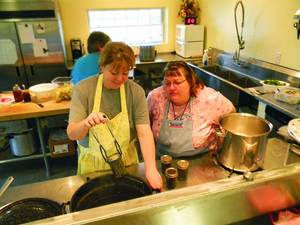17 Feb Thu 2011
Preservation: My thoughts on its mystery and magic
When I'm teaching a beginner's Canning Class, I always make a point of impressing on the students how utterly miraculous food preservation really is. No, really.
How is it that by applying heat to a sealed jar, you simultaneously kill bacteria that can't stand the heat, while "smothering" heat-insensitive bacteria that must have oxygen? I know, I'm a canning nerd. But all forms of food preservation just make the nerd in me blossom: cure it with salt, soak it in honey, dump it in vinegar, dry it in the sun. Nature provides this wonder that's enabled mankind to survive tough winters, saved entire nations of people from starvation, and helped explorers and warriors travel to far-away lands - even the moon.
I came across this favorite passage today, and thought it summed up my adoration of the preserving sciences and the miracle that it is:
An understanding of what food is and how cooking works does no violence to the art of cuisine, destroys no delightful mystery. Instead, the mystery expands from matters of expertise and taste to encompass the hidden patterns and wonderful coincidences of nature. How remarkable it is, when you come to think in such terms, that heat has the fortunate effects on the flavor and digestibility of plant and animal tissues, that roast and meringue are two different outcomes of the same process, that wheat proteins have just the right balance of properties to make raised bread possible, that bread, cheese and yogurt, beer and wine are all the result of controlled spoilage! Science can enrich our culinary experience by deepening its significance, by disclosing its connections with the rest of the world.
-Harold McGee, On Food and Cooking: The Science and lore of the Kitchen (1991)
OK, I'm stepping down from my soap box now. But the next time you open a jar of applesauce, or fry a few strips of bacon, think of how nature's "coincidences" made your breakfast possible.

